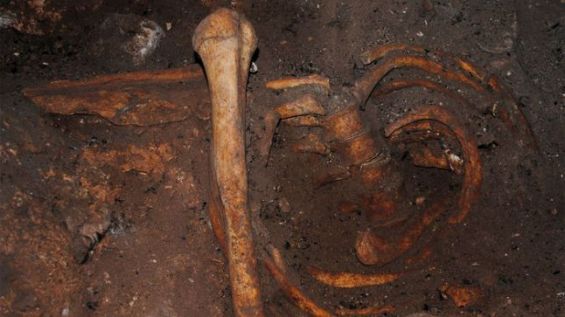An international team of researchers has sequenced DNA from individuals from Morocco dating to approximately 15,000 years ago in Grotte des Pigeons, near Taforalt in Morocco, the Ministry of Culture and Communication said in a statement, adding that this is the oldest nuclear DNA from Africa ever successfully analyzed.
The individuals, dating to the Late Stone Age, had a genetic heritage that was in part similar to Near Eastern populations and in part related to sub-Saharan African populations, as published in the US magazine Science.
«A better understanding of the history of North Africa is critical to understanding the history of our species,» explains co-author Saaïd Amzazi from Mohammed V University in Rabat, Morocco.

In order to address this, the team looked at a burial site in Grotte des Pigeons, near Taforalt in Berkan, associated with the Later Stone Age Iberomaurusian culture. The Iberomaurusians are believed to be the first in the area to produce finer stone tools known as microliths.
«Grotte des Pigeons is a crucial site to understanding the human history of north-western Africa, since modern humans frequently inhabited this cave intensively during prolonged periods throughout the Middle and Later Stone Age,» explains co-author Louise Humphrey of the Natural History Museum in London. «Around 15,000 years ago there is evidence for more intensive use of the site and the Iberomaurusians started to bury their dead at the back of the cave.»
Dual genetic heritage
The researchers analyzed DNA from nine individuals from Taforalt using advanced sequencing and analytical methods. They were able to recover mitochondrial data from seven of the individuals and genome-wide nuclear data from five others. Because of the age of the samples, at approximately 15,000 years old, and the poor preservation characteristic of the area, this is an unprecedented achievement. «This is the first and the oldest Pleistocene DNA of our species recovered in Africa,» explains co-senior author Abdeljalil Bouzouggar.
«Due to challenging conditions for DNA preservation, relatively few ancient genomes have been recovered from Africa and none of them so far predate the introduction of agriculture in North Africa,» explains first author Marieke van de Loosdrecht of the Max Planck Institute for the Science of Human History. "Successful genome reconstruction was possible by using specialized laboratory methods to retrieve highly degraded DNA, and relatively new analysis methods to characterize the genetic profiles of these individuals.»
The researchers found two major components to the genetic heritage of the individuals. About two-thirds of their heritage is related to contemporaneous populations from the Levant and about one-third is most similar to modern sub-Saharan Africans, in particular West Africans.
The international team of researchers, led by Johannes Krause and Choongwon Jeong from the Max Planck Institute for the Science of Human History (Jena, Germany), and Abdeljalil Bouzouggar from the Institut National des Sciences de l'Archéologie et du Patrimoine (Rabat, Morocco) included scientists from the Mohammed V University in Rabat, the Natural History Museum in London, University of Oxford, Université Mohammed Premier in Oujda and the Max Planck Institute for Evolutionary Anthropology in Leipzig.





 chargement...
chargement...













